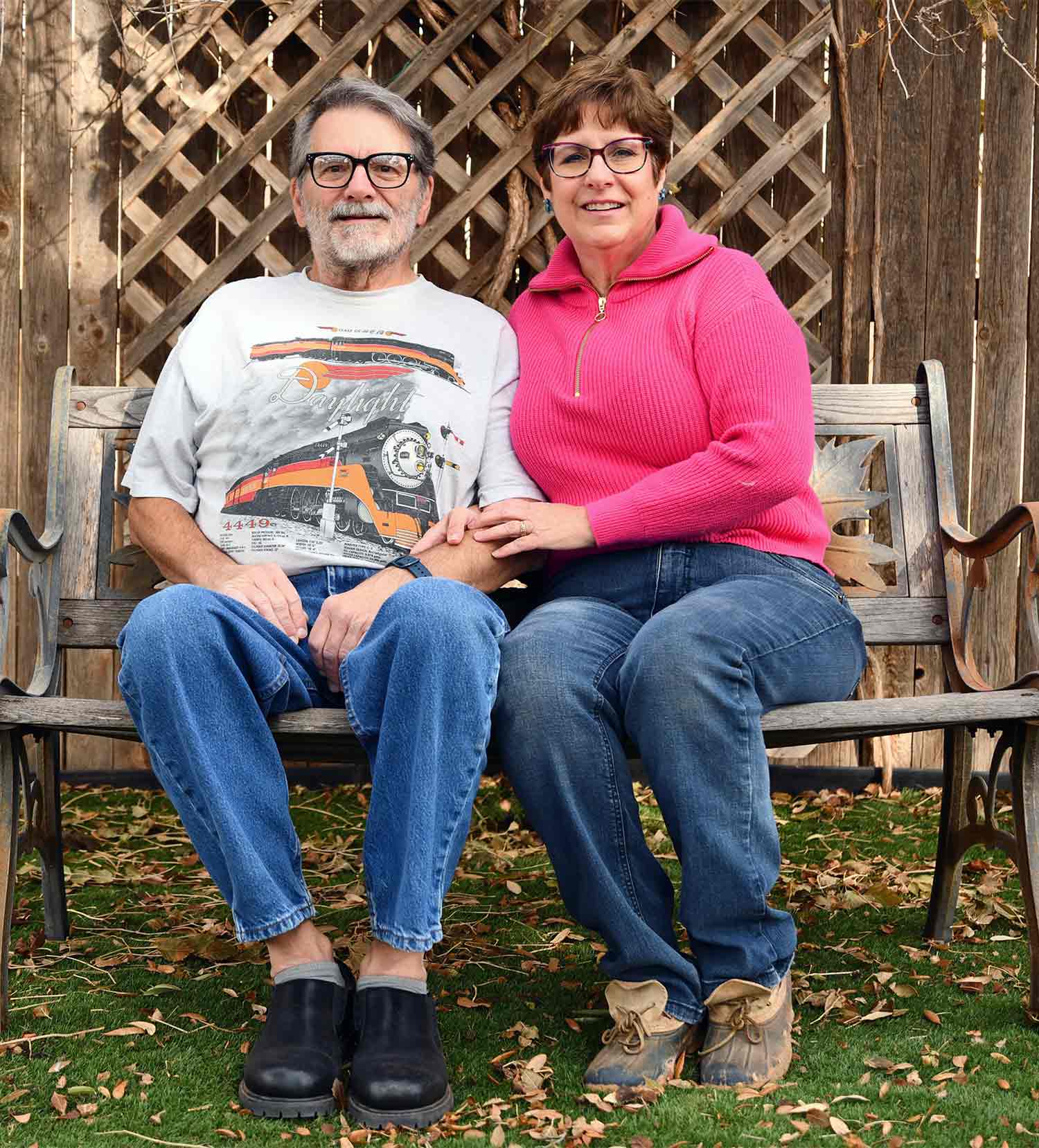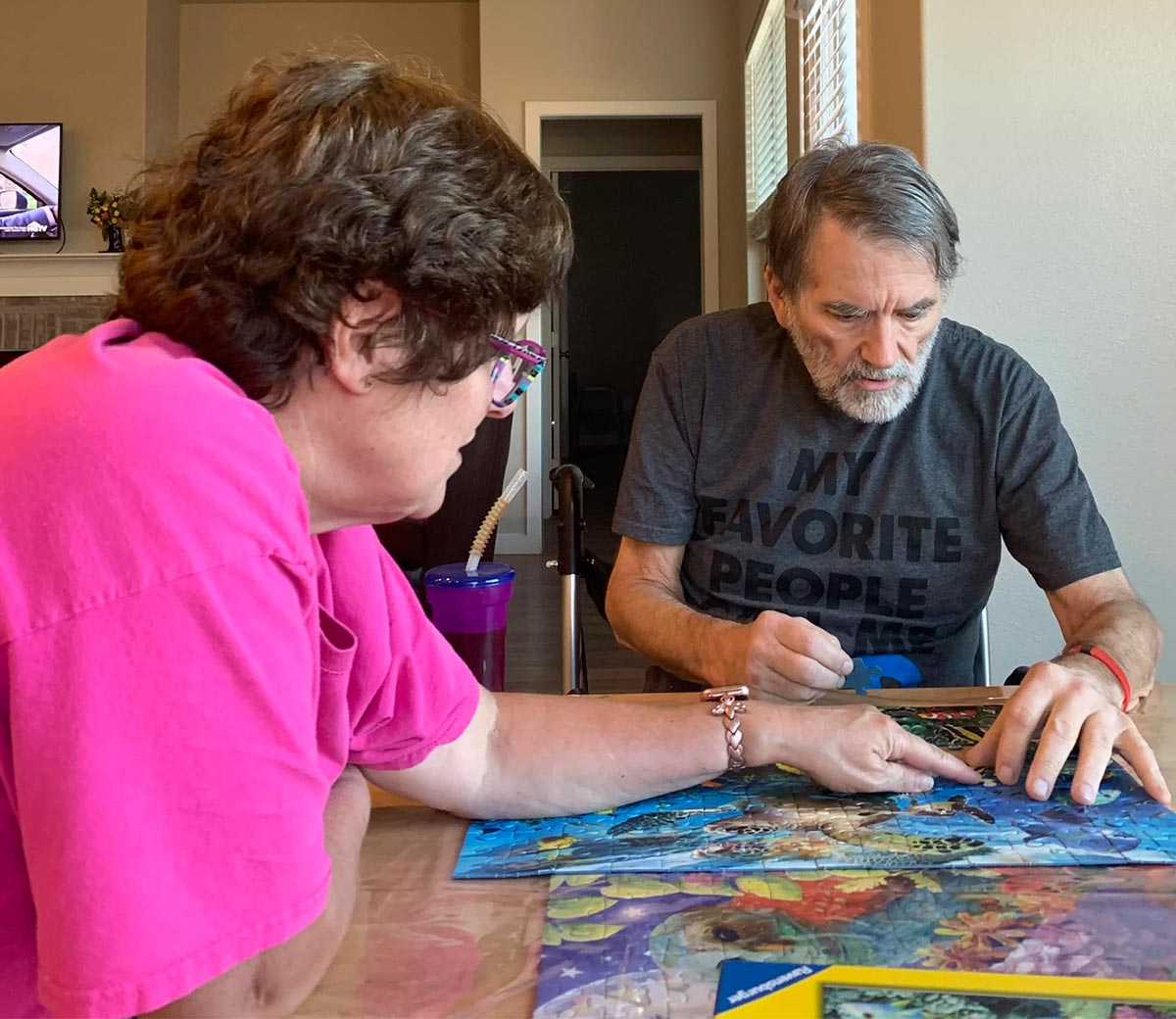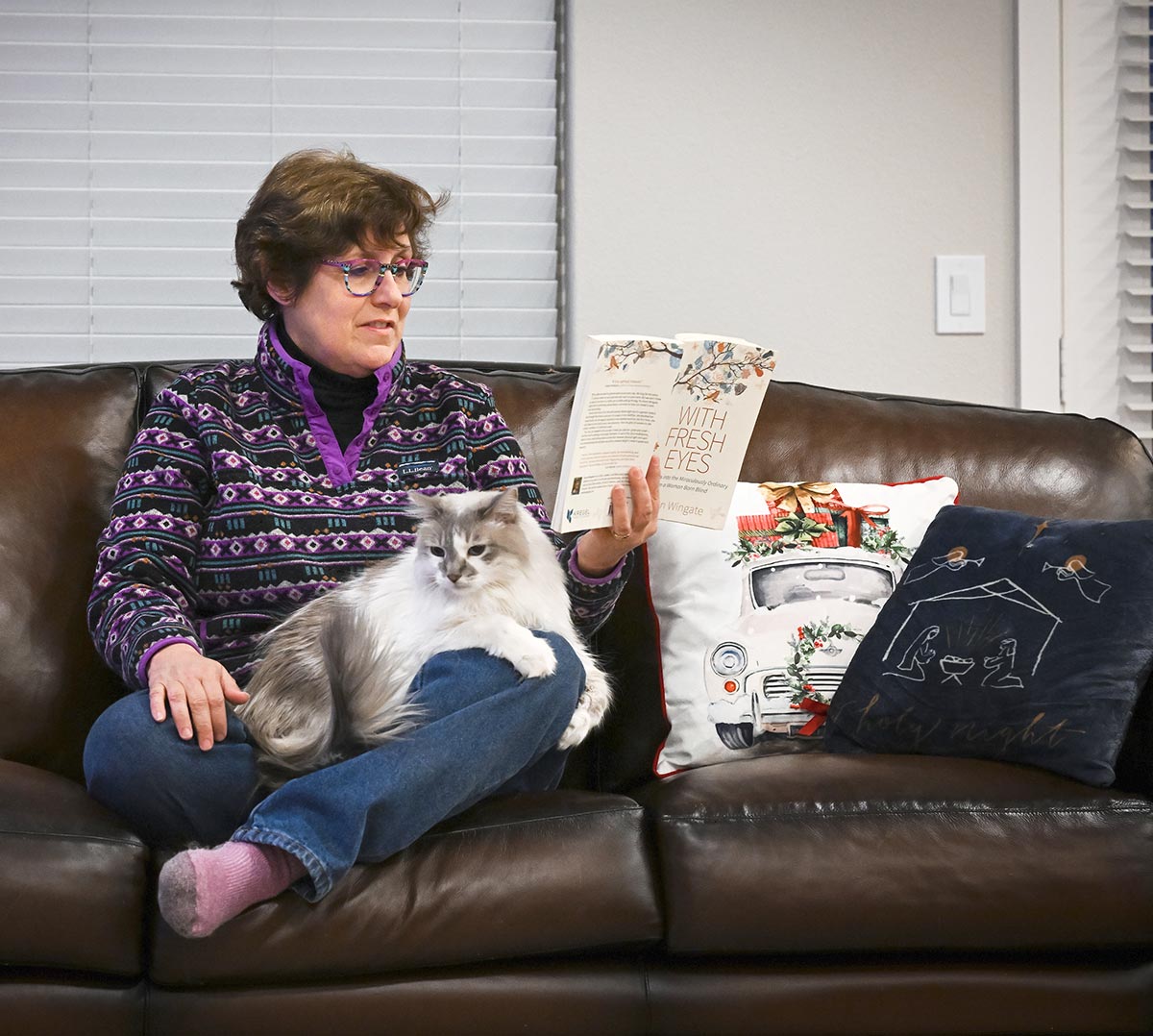
Lessons from ‘The Long Goodbye’
red flag warnings
The first signs of trouble came 10 years ago. Jim Bertrand, a 63-year-old engineering designer, was active and athletic, regularly enjoying hikes with his wife, Susan Bergeson, PhD. But then, says Bergeson, “he started face-planting.” He would trip and, inexplicably, not try to break his fall. It happened in a national park. It happened at work. More than once, Bergeson had to treat a bloody gash on her husband’s head.
“I thought, ‘That’s not normal,’” says Bergeson, a University Distinguished Professor in the School of Medicine Department of Cell Biology and Biochemistry. “So, I asked Dr. Edwards to give him the mini mental test.”
David Edwards, MD, (Medicine ’02), associate professor in the School of Medicine Department of Family and Community Medicine, was Bertrand’s primary care physician, and he administered the Mini Mental State Examination, a common tool for diagnosing cognitive impairment. Bertrand did well on some parts, but when prompted to remember the three words he had been told earlier in the test, he drew a blank.
He also became forgetful, leading to confrontations along the lines of, “You never told me that.” Because his mother had Alzheimer’s disease, Bertrand agreed to genetic testing, which revealed he was indeed at risk. An MRI showed no signs of other types of dementia, and based on the behavioral symptoms, Edwards diagnosed Bertrand as having “probable” Alzheimer’s. Bertrand’s decline over the next 10 years left little doubt. The journey came to an end Sept. 26, 2023, when he died at home in his wife’s arms.
Over the course of those 10 years, Bergeson learned a considerable amount about caring for a loved one who has Alzheimer’s, an experience many people call “the long goodbye.” She shared some of the journey in real-time posts to her Facebook page, describing times of exhaustion and frustration as well as moments of gratitude and serenity. And even now, after her husband’s passing, she’s still eager to talk about her experience, in hopes it might prove useful to others on a similar path. As she put it in one Facebook post: “If anything helps others in my same boat, it will have been worth it.”
bring in the experts
Bertrand was lucky, in a way, that his dementia was diagnosed early, when his symptoms were relatively mild. It meant that the couple could start seeing an Alzheimer’s counselor, and Bertrand could participate in decisions about his future care. He signed a Do Not Resuscitate order, and he agreed to donate his brain after his death to the Brain Bank in TTUHSC’s Garrison Institute on Aging.
Early detection also meant that he could benefit from taking the drug donepezil, which can alleviate some symptoms but works best in the first stages of dementia. Bergeson is convinced that the medication gave her husband several extra years of decent cognitive functioning. “I’m forever grateful for that,” she says.
As Bertrand’s condition worsened, he started seeing John Culberson, MD, an associate professor in the School of Medicine Department of Family and Community Medicine, who specializes in geriatrics. One intervention that Culberson recommended was a speech therapist. “Alzheimer’s disease is a verbal illness,” Culberson says. “A speech therapist can work on helping the person communicate their needs a little bit.”
Culberson also played bad cop when needed — he was the one who told Bertrand that he could no longer drive, and at one point, he made a short video that Bergeson could play on her iPhone, telling Bertrand, “Jim, use your walker. I don’t want you falling again.” Says Bergeson, “I knew that if Dr. Culberson told him what to do, it would work better than if I did, and it also allowed me to be Jim’s loving wife and not the person ‘in charge’ of him.”

Toward the end of Bertrand’s illness, the couple also enrolled in a project for people with either dementia or Parkinson’s disease, managed by Jonathan Singer, PhD, assistant professor of clinical psychology at Texas Tech University, who specializes in psychological health in aging and illness. One of his studies involved a recreation program: Bertrand spent three hours a week playing games and music and watching movies with other patients, while his wife got a much-needed break from caregiving.
Bergeson also got ideas she could use at home. “There were things they did that brought joy to Jim’s life that I wouldn’t have thought to do,” she says, like working with Play-Doh and batting a balloon back and forth. Through Singer’s program, Bergeson also saw an individual counselor —a graduate student named Carol Fadalla —who specialized in helping caregivers, with an emphasis on “pre-death grief.” That experience would soon prove invaluable.
find a support group — or become one
There’s a photo on Bergeson’s Facebook page from Thanksgiving 2022. She and her husband are sitting arm in arm on a wooden bench outside their home, a smiling, attractive couple on a sunny autumn day. “Happy Turkey Day 2022,” reads the caption. At that point, “Jim was pretty functional,” Bergeson says.
But, with the start of 2023, his health began to deteriorate, and Bergeson began posting more openly about it. At first, Facebook was just a convenient way to keep family and friends informed. But as time went on, Bergeson also found Facebook useful for asking advice. In February, she wrote: “To all my friends with loved ones with dementia: Does your person make up new words you can’t figure out? … Yesterday, for a good half hour, he was chatting with me about something, and I couldn’t figure it out. I held his hand and nodded … I felt a bit helpless. … Any advice?”
Other posts reflected the reality of daily life: “Alzheimer’s is so perplexing … tonight I found used napkins (trash) and a folded pile of clean laundry in the KITCHEN CUPBOARD!!! And clean dishes in the REFRIGERATOR. He’s keeping me on my toes.” Still, others revealed the toll of caregiving: “I am beyond exhausted.”
grieve a little along the way
In June, Bertrand suffered an episode of kidney failure that seemed to aggravate his dementia; he became violent, and Bergeson had to call 911. Bertrand ended up in the hospital for five days. His kidneys eventually rebounded, but the Alzheimer’s seemed worse after that: Bertrand became more agitated, his middle-of-the-night hallucinations intensified, and he became less and less able to care for himself. “It’s a good thing bodily fluids don’t bother me,” Bergeson said on Facebook.
By late July, the medical team became concerned about the strain on Bergeson and raised the idea of beginning hospice care. “Dr. Klein actually called me on a Friday night while I was trying to finish writing a grant,” Bergeson recalls. “She said, ‘I think we should talk about Jim.’”

Kelly Klein, MD, (Medicine ’95) is an associate professor in the School of Medicine Department of Family and Community Medicine; in addition to being Bergeson’s primary care physician, she also specializes in hospice and palliative medicine. She told Bergeson that Bertrand could continue to live at home; the hospice designation — which comes after physicians certify that death is likely within six months — simply enables additional, specialized providers to become involved in his care. “It’s a team approach to the end of life,” Klein says. A certified nursing assistant began caring for Bertrand during the day, and other professionals and volunteers made regular visits.
Bertrand continued to decline. On Sept. 13, Bergeson wrote on Facebook, “Sad tonight — it seems the prognosis is now about two months.” The end, as it turns out, came even more quickly than that. On Sept. 26, Bergeson posted, “With a heart full of love, I let you know that Jim died peacefully in my arms this morning with his kids on the phone. His suffering is over. I asked God to give me all of Jim’s goodness and especially his patience.”
The counseling that Bergeson had done in Singer’s program, as well as counseling she had sought years earlier when Betrand was diagnosed, helped her deal with much of the grief in advance — so much so that she felt ready to go back to work two days after Bertrand’s passing. Helpful, too, was the realization that she had stayed true to his wishes throughout.
“While it’s difficult to keep your commitment to your loved one, the reward on the other side is tremendous,” she says. “I really feel good about how I cared for him. I have no guilt.
“I did what it took to take Jim all the way to the end.”